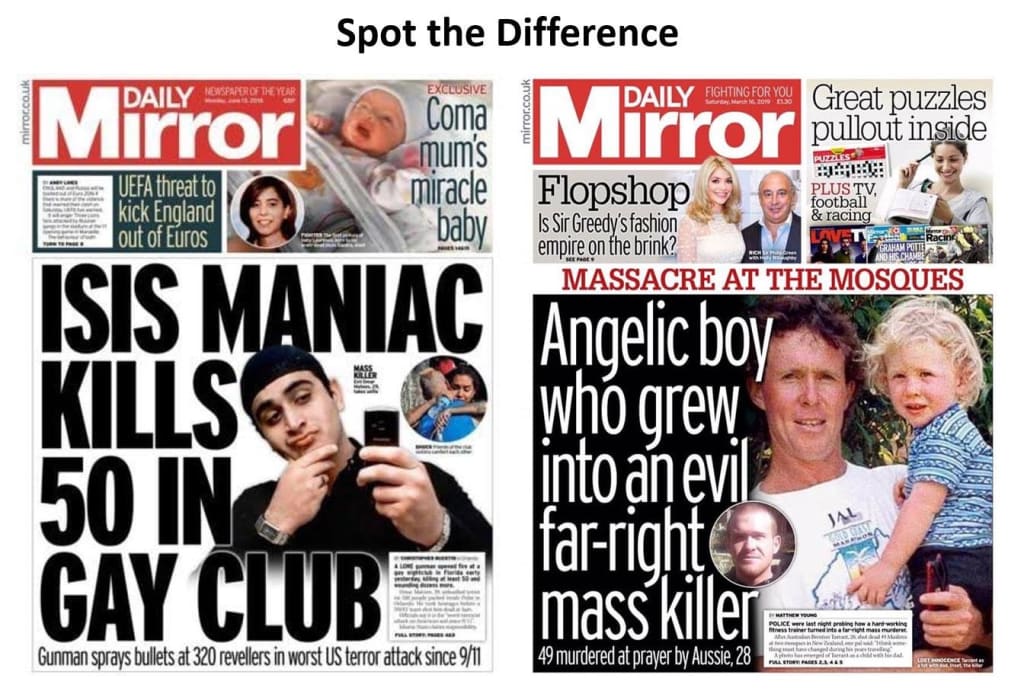How the Media Fuels Terrorism
Words are weapons, choose them wisely.

In the wake of the horrific Christchurch terror attack that left 49 innocent people dead, we are reminded of the perpetual ignorance of the global media.
Whether you put it down to sheer ignorance, or something much more intentionally evil, the effect is the same; the normalisation of “Othering” language and our proclivity for empathy towards white perpetrators.
Note how the Daily Mail reminds us of the youthful angelic purity of the most vicious mass-murderer in NZ history, even going so far as to publish his baby pictures. Conversely, Omar Mateen - the man responsible for the shooting at Pulse nightclub in June 2016—was derided as a "monster" and given no humanising backstory whatsoever. Note also, that even though both attacks resulted in 49 deaths, the number mentioned in the Mateen story accounts for each of the 320 club goers present, whereas the number mentioned in the Christchurch story is a tally of deaths only. Neither narrative tells the whole story. The omissions are careful and deliberate, and the reality lies somewhere in the middle of the two yarns. In order to get to the bottom of why people become radicalised (something I think nobody truly understands, because little effort has been made) we have to look past this divisive vernacular and actually pick apart the social factors that drive individuals to extremism.
In the UK, the rhetoric surrounding controvertial British citizen and ex-ISIS devotee Shamima Begum makes no attempt to remind the public that she too was once a perfectly innocent child who became a victim of brainwashing by an international death cult. Made to feel alien in her own country, she was vulnerable, and was pulled towards violent right-wing ideologies by experienced professional groomers. Although the right-wing media would never claim to be pro-terrorism, it's "us vs. them" rhetoric is precisely what enables groomers to so easily indoctrinate new victims. They thrive on it. More than that, they depend on it.
The media would have us believe that there is a terrorist hidden inside every Muslim, waiting to be freed by a set of keywords à la The Manchurian Candidate. White terrorism, on the other hand, is depicted as some sort of tragic fall from grace with no concrete explanation. We are supposed to empathize with white terrorists and ask ourselves "what went wrong?". Why do BAME terrorists not demand the same level of introspection? White terrorism is seen as a symptom of a larger problem; distill the message and we are left with a victim narrative that is entirely absent from stories about anti-imperialist terrorism.
And this is the keyword: anti-imperialist. The IRA are a predominantly white organisation, yet there is no hesitation to label them as terrorists. Why? Because they are a threat to Western Imperialism, and therefore represent the same demon as Daesh and Al-Qaeda. Nelson Mandela, a freedom fighter who subsequently secured a place in the establishment, was an enemy of the Euro-centric South African government. He was swiftly labelled as a terrorist but is now widely regarded as a hero: proof that the narrative will change to suit the current political climate. The division in language occurs depending on if the perpetrator is for or against the status quo.
White supremacist violence mirrors the same tactics as terrorists throughout history, yet it is only very recently that the media has begun to apply the "T-word" to them at all. Put simply, white terrorists pose little threat to today's working systems of power. Indeed, they support it: while ISIS seeks to destroy the West, it inspires reactionary violence from the other side, as an apparent defense against the supposed Islamic cultural invasion discussed by right-wing journalists.
Without Western imperialism, it is unlikely that violent non-state actors such as Daesh would exist as prominently as they do today. They are the latest iteration in a lineage of such organisations, and they naturally create a hostile response in the West. Tiny embers of Islamophobia flicker into existence; stoked by the great bellows of right-wing journalism, they burst into flames of extremism. Radicalisation happens on both sides of the conflict - in the alt-right sphere, it largely happens online. Fallacious racist Islamophobic rhetoric is the gateway drug to deliberate self-exposure in the name of "curiosity", disenfranchised young white males might get caught up in the narrative, and for various reasons could become radicalised after investigating the darker side of right-wing Reddit and 4chan boards like /pol/ (short for "Politically Incorrect). Even public figures ranging from Jordan Peterson to PewDiePie have their part in the normalisation of such attitudes and the subsequent radicalisation of individuals. And thus a terrorist is born.
These white extremists are pro-West, but anti-multiculturalism. This position is drenched in irony. We must consider why the West has become home to so many Muslims and people of Middle-Eastern descent: culturally, the West has always exported an image of itself as a land of opportunity and freedom and progressivism. Meanwhile, military intervention has left much of the Middle-East directly or indirectly destabalised - areas that haven’t fallen victim to Western bombs or soldiers might instead become occupied by anti-West Islamist fundamentalist forces. Simple cause-and-effect, instigated ultimately by us.
Before we go pointing fingers, we must first look at ourselves and the impact we have upon the world. We must permit ourselves to humanise terrorists on both sides of the conflict. They are, after all, human. Only once we can open ourselves to empathy, can we begin to really tackle the issue at its heart.
About the Creator
Toby Hickman
Things that spark my neurons.






Comments
There are no comments for this story
Be the first to respond and start the conversation.